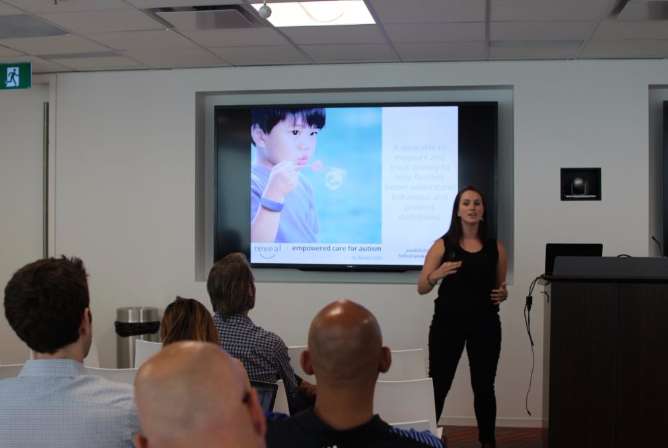A few weeks ago, Mastercard announced the winners of The Next 36 Mastercard Challenge, which invited five Next 36 startups to pitch and receive mentorship from Mastercard execs and employees.
The competition was part of an overall strategy from the financial institution to more closely collaborate with startups. Brian Lang, president of Mastercard Canada, spoke with BetaKit about how the company is embracing the entrepreneurial spirit at its own offices as it evolves alongside the age of digital payments.
What are some ways that Mastercard has made working with startups a priority?
The future of innovation in Canada rests largely on the shoulders of the entrepreneurs who launch and operate new businesses in Canada. Startups are an essential part of the economy and we’re committed to fostering that entrepreneurial spirit in Canada and globally.
“The right corporate-startup partnership can be the key to unlocking success and innovation.” – Brian Lang, Mastercard Canada
We announced last year the launch of Start Path Global – a unique six-month partnership program for startups that extends Start Path’s existing footprint to a greater number of countries globally in Asia Pacific, Middle East, Africa, and Latin America. Mastercard Start Path is a global effort to support innovative early-stage startups developing the next generation of commerce solutions today.
In Canada, we also organized the second edition of the Mastercard Challenge Pitch Day, where five teams that are currently in The Next 36 program were selected to pitch their startup businesses to a panel of Mastercard executives as part of the Mastercard Challenge.
Each of the teams was paired with some of our top Canadian business leaders who provided them with mentorship and guidance. From the initial five, employees voted Awake Labs as the winning team and I’ll spend time with the team to discuss business and provide advice wherever I can.
How does working with a larger organization like Mastercard benefit startups – what can they learn from you?
In today’s rapidly evolving retail environment, the right corporate-startup partnership can be the key to unlocking success and innovation – this is where we can be a valuable resource to these companies.
Startups can benefit from the knowledge of a global network of Mastercard experts, customers and partners, and the ability to innovate on top of our solutions.
Mastercard experts in different areas within the business are also a great resource to help startups learn how to navigate regulatory challenges, shape ideal technology platforms, and build a clear brand strategy, which we have successfully done throughout the years.
Okay, so let’s talk about the other side of this innovation partnership. Why is connecting with the startup community important for Mastercard?
Our company was once associated with plastic credit cards. Now, we’re increasingly going virtual, digital, and mobile, introducing biometric and other technologies that push the boundaries of innovation in payments.
We have a vision of leading technology innovation in the payments industry, so staying close to the startup community is key. It’s only natural that we develop those close relationships with startups so we can learn from them as much as they can learn from us.
How is Mastercard taking what it learns from startups to try and foster innovation internally?
At a global level, we have a number of internal programs to foster innovation. The idea is to give employees the time and incentive to create innovative products and services, while giving them access to the tools and resources they need to do so. The programs, all run by Mastercard Labs, award different prizing depending on the complexity of the challenge. For example, a recent challenge saw the entire global employee base voting on one of five employee teams and their payment products – with the winning team seeing their product launched under the Mastercard umbrella (and winning some cash, of course!).
Related: Mastercard Chief Innovation Officer Garry Lyons on innovation as a repeatable process
Across the organization, we all felt that if we were going to successfully fulfill our vision of leading technology innovation in the payments industry, then we would need to live these values every day. In Canada, specifically, we wanted to be inspired every day by not only our work but our surroundings, which led us to move into an open concept office in Toronto. Previously, colleagues were separated by closed doors. Now, our entire executive team, including myself, sit in open workspaces.
Can you tell me what’s changed about what Canadians expect from payments technology – and how working with startups fits into that?
Canadians are early adopters when it comes to digital payments and embracing new technologies. It became very clear to us that they wanted and expected faster and safer ways to pay. It was only natural that Masterpass, Mastercard’s digital wallet, was launched in 2013 in Canada before any other country.
“Canadians are early adopters when it comes to digital payments and embracing new technologies.”
With more and more Canadians wanting a secure, seamless, and simple payment experience we also felt there was an opportunity to work closely with startups and the developer community to organize hackathons in Canada, which we’ve done in recent years through Mastercard N>XT in 2013 and 2014 in Toronto, and the Mastercard Masters of Code competition in 2015.
Masters of Code was a global event focused on the “connected life” that challenged tech innovators to create an app that makes it easier for people to learn, travel, commute, shop or pay for everyday items. Montreal hosted the Canadian competition. The winning Canadian team joined global competitors in California to vie for $100,000 in prizing and an incubation spot at the Mastercard Start Path acceleration in Dublin, Ireland, and six months of mentoring from a member of the Open API Mastercard and Path Start program team.
What new technologies are you currently working on integrating into payments?
This year Mastercard partnered with BMO Financial Group to announce the beginning of a phased launch of ID Check (although everyone calls it ‘selfie pay’), the first biometric program in Canada and the US to enable cardholders to verify transactions using facial recognition and fingerprints when making online purchases.
The use of biometric technology has become more common for consumers looking for convenient and secure ways to make purchases using their smartphones, so this was the natural next step for us.
We also announced this year that we were bringing Apple Pay to Mastercard cardholders in Canada — another example of how we are transforming mobile payments with an easy, secure, and private way to pay that’s faster and more convenient than ever. At the heart of mobile payments is the assurance that transactions are protected with the highest level of security.
You recently underwent a brand change – what was the thought process behind that and what does it mean for Canadians?
Mastercard is one of those unique brands that is easily recognized around the world. To thrive in this new digital world where business moves faster than ever, we wanted to modernize and elevate our brand with a design that is simple and elegant, yet unquestionably Mastercard.
See what other startups had to say about The Next 36 Mastercard Challenge:



